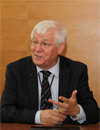 |
||
|
US to Spend $1 Trillion on Nukes, but Payoff Unclear – Study RIA Novosti, PUBLISHED 08.01.2014 The United States plans to spend $1 trillion on upgrading and maintaining its nuclear arsenal over the next 30 years, but delays in replacing current systems threaten to weaken US nuclear deterrence, according to a new independent study. “The new procurement schedule still entails significant programmatic risks and will likely result in even higher costs, lower capability, and slower deployments,” according to a study released Tuesday by the California-based James Martin Center for Nonproliferation Studies. Obama has endorsed the total elimination of nuclear weapons, but his administration has said significant funding earmarked for modernization is necessary “to maintain a safe, secure and effective nuclear deterrent.” Topics: USA Other news: Rosatom Boosts Foreign Orders Portfolio to $74 Bln Rosatom signed in Helsinki an expected deal with Finnish nuclear consortium Fennovoima on the construction of a 1,200-megawatt Hanhikivi-1 nuclear reactor in Pyhajoki, northwest Finland. First Chapter of US-Russian Megatons-to-Megawatts Deal Closes Russia started delivery of the last batch of low-enriched uranium to the United States under a long-standing program to convert Soviet-made nuclear weapons into fuel. Russia Starts Building Largest-Ever Nuclear Icebreaker The yet-unnamed ship, to be powered by two nuclear reactors, will be 14 meters (46 feet) longer and four meters (13 feet) wider than the current largest, the 50 Let Pobedy (50 Years of Victory). |
Hero of the day 
We are currently working with the Nuclear Decommissioning Authority (NDA) on this approach, which was submitted in response to their February 2012 call for alternative proposals. We appreciate that the UK is in the early stages of their policy development activities and are pleased to be involved in such important work. INTERVIEW
Yanko Yanev OPINION
Joint Plan of Action |

